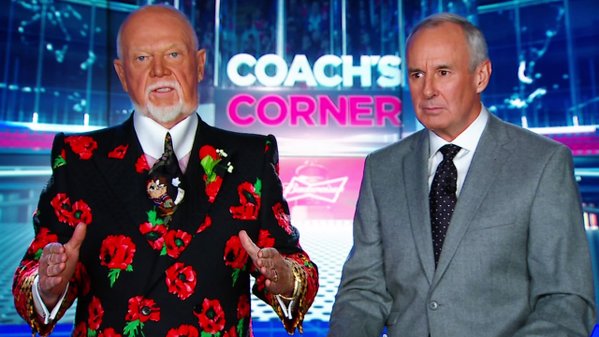

The following tweets were part of a series made at the blue-check-marked and verified Twitter account for Don Cherry:
“I know the Blue Jays read my tweets…You got stiffed! Why? Because a Canadian…” (quote resumes in another tweet due to limitations) “…team in the World Series would be a TV disaster in the States. Blue Jays you can’t beat Kansas City and the umpires too.”
in other tweets, Cherry noted the missed call that would have tied game six of Ithe ALCS in the ninth; the well out of the strike zone pitch that was called a strike against Ben Revere as the game peaked, and an apparent fan-interference double that instead went in KC’s favor as a home run.
In the overall context of Cherry’s remarks, the reference to the Jays being “a TV disaster in the States” can only be taken to mean that Cherry regards the result/umpiring of game six being more in line with economics than any kind of fair play. In truth, it’s a point that has been made many times before.
Kendall Thu isn’t someone that sports fans will be too familiar with, but I guarantee that he knows a lot more about sports than your average nacho eater. A cultural anthropologist with Northern Illinois University, Thu and others argued in a 2002 paper entitled “Keeping the Game Close: Fair Play Among Men’s College Basketball Referees” that there was a foul-calling phenomenon in college basketball.
“Referees,” Thu claimed, “tend to keep nationally televised games close by calling a significantly higher number of fouls against teams that are ahead in the score. This results in more competitive games that maintain an edge of suspense for viewers. Interestingly, we don’t find the same pattern in games televised on a regional basis.”
Basically, when the stakes are high for advertising revenue in nationally televised games, the refs aren’t objective regarding the rules and codes of the game. Instead, Thu’s claim suggests, they are motivated to keep people from changing the channel as economic forces trump the rules of basketball.
Another example of economics seemingly trumping fair play could be taken from game six of the 2002 Western Conference Finals in the NBA. Up 3-2 in the best-of-seven series, the small-market Sacramento Kings were handing it to the gigantic market Los Angeles Lakers big time. The Kings winning game six would have set up a less-than-marquee NBA Finals match-up between the Kings and the New Jersey Nets.
It was too much.
Los Angeles was awarded 27 free throws in the final quarter, and so many key players on Sacramento fouled out that Lawrence Funderburke had to come in. Kobe Bryant of the Lakers, in one of the most notorious plays, leveled Mike Bibby. For Kobe’s efforts, he was awarded free throws instead of what could have been called a flagrant foul against him.
Michael Wilbon of The Washington Post was covering the game: “I wrote down in my notebook six calls that were STUNNINGLY incorrect, all against Sacramento, all in the fourth quarter when the Lakers made five baskets and 21 foul shots to hold on to their championship” (emphasis added).
Los Angeles won game six. Los Angeles won game seven. Los Angeles won the 2002 NBA Finals, and everyone thinks the title reflects on how great Bryant is.
Years later in 2008 Tim Donaghy, a disgraced NBA referee, claimed that the game was fixed. Years after that, following many unsuccessful seasons and declining profits, the Kings wanted to move to the greater Los Angeles area – and why not?
The bigger your market, the bigger your fan base. The bigger your fan base, the more the league will want you to stay alive in the playoffs. That’s how you play NBA basketball, ain’t it? Or is it about the wind sprints, weight lifting, and teamwork still?
Of course the Lakers didn’t like the thought of Sacramento infringing on their market any more than people like chickens coming home to roost. So Sacramento remain in limbo, all because they were too small to make it, in my opinion – even if their players were the best that season.
I could think of many more examples of sporting results that I am suspicious of. But then how do you ever know if a bad call is crooked or just genuinely an error? At bottom, you don’t know but I would like to see a greater awareness on the parts of fans for the economics that surround sports, economics that could be determining or at least influencing the outcomes of games.
Regarding the 2015 ALCS, it is unquestionable that Major League Baseball’s reputation has just nose-dived in Canada. I don’t know what the long-termed effects will be but if Toronto fans assume that their team is disadvantaged, even with the best lineup, it can’t be good for the popularity of baseball north of the border. On the matter of whether the Royals got the nod to go to the World Series to avoid a “TV disaster” or whether they earned it, my personal feeling is in line with Mr. Cherry’s.
But regardless, all should agree that Major League Baseball is in need of improved consumer relations and enhanced officiating. Without the results of key games being respected by fans of both teams, interest could decline.
As far the 2015 Royals go, they are a team who barely beat the Houston Astros, who did not prove that they could beat the Jays, and who have been gifted a World Series coin-toss against the New York Mets.
In short, the asterisks for baseball are still mounting.

